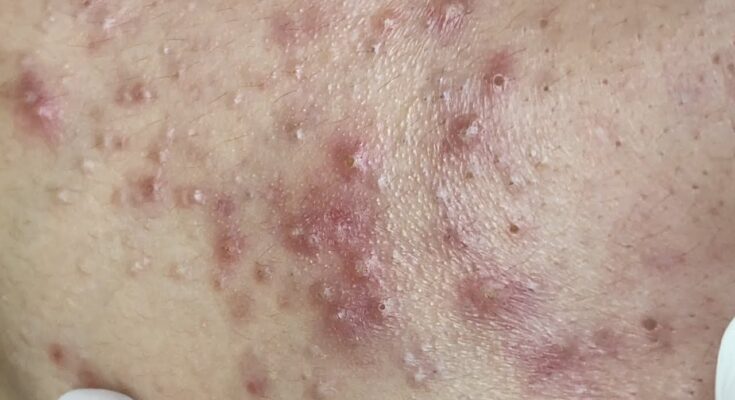Acne treatment can vary depending on the severity of the acne and your skin type, but here are some effective general treatments that can help manage acne:
1. Gentle Cleansing
- Purpose: Cleansing helps remove dirt, oil, and impurities that can clog pores and contribute to acne.
- What to Use: Look for a mild, non-comedogenic (won’t clog pores) cleanser, preferably one with salicylic acid or benzoyl peroxide if you have oily skin or acne-prone skin.
2. Topical Treatments
- Benzoyl Peroxide: Reduces acne-causing bacteria and helps with inflammation. Available in various strengths (2.5%, 5%, and 10%).
- Salicylic Acid: A beta hydroxy acid (BHA) that exfoliates the skin and unclogs pores. It helps prevent new breakouts from forming.
- Retinoids (Retinol/Adapalene): These promote cell turnover, which prevents pores from becoming clogged with dead skin cells. Adapalene (Differin) is an over-the-counter retinoid that’s often used for acne.
- Azelaic Acid: Reduces inflammation and has antimicrobial properties. It can help with both acne and hyperpigmentation.
- Niacinamide: Anti-inflammatory and can help reduce redness and irritation in acne-prone skin.
3. Moisturizing
- Even if you have acne, moisturizing is important! Use a non-comedogenic moisturizer to keep your skin hydrated and prevent the overproduction of oil that can lead to more breakouts.
- Look for: Lightweight, gel-based moisturizers or those labeled as “oil-free.”
4. Spot Treatments
- If you have occasional breakouts, spot treatments with ingredients like benzoyl peroxide, sulfur, or tea tree oil can help target individual pimples.
5. Prescription Treatments (for Moderate to Severe Acne)
- Oral Antibiotics: For more serious cases of acne, dermatologists may prescribe oral antibiotics like doxycycline or minocycline to reduce inflammation and bacteria.
- Oral Contraceptives: For females, birth control pills can sometimes help regulate hormones that contribute to acne.
- Isotretinoin (Accutane): A strong oral retinoid for severe acne that doesn’t respond to other treatments. It’s highly effective but comes with potential side effects, so it’s often a last resort.
6. Avoid Picking or Squeezing Pimples
- While it can be tempting, squeezing or picking at pimples can make the problem worse by pushing bacteria deeper into the skin and increasing the risk of scarring.
7. Sun Protection
- Many acne treatments can make your skin more sensitive to the sun. Use a broad-spectrum sunscreen of SPF 30 or higher to protect your skin from harmful UV rays.
8. Diet and Lifestyle
- A balanced diet rich in fruits, vegetables, and whole grains can support skin health. Try to limit your intake of dairy and high-glycemic foods (like sugar and white bread) that may exacerbate acne in some individuals.
- Drinking plenty of water and getting enough sleep can also have positive effects on your skin.
9. Consistency Is Key
- Acne treatments take time, often 4–6 weeks, to show visible improvement. Be consistent with your routine and give the products time to work.
When to See a Dermatologist:
- If over-the-counter treatments aren’t working or your acne is severe (e.g., cystic acne), it’s a good idea to consult a dermatologist. They can provide more personalized treatment options and might prescribe stronger medications.



